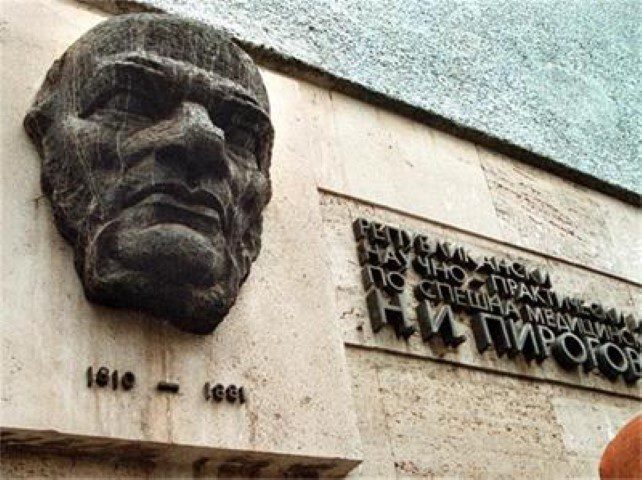Roumen Vodenicharov
Sofia, Bulgaria

In Europe there is a Slavic nation who will always respect and never forget one name, a name that even children recognize and can put a face to. No, it is not the name of a movie star, a football player or a politician. Thousands of patients from all over the country are greeted by the unforgettable Dr. Nikolay Ivanovich Pirogov, a sculpture made out of carved stone, watching from the façade of the most respected emergency hospital in Sofia, Bulgaria. To pay their respect, Bulgarians have raised a monument, 3 rotundas, and 26 obelisks. Even 136 years later, the grateful citizens pay their tribute for the good deeds one foreigner has done for their homeland.
In 1877 Russia waged a war against Turkey. The aim was to liberate Bulgaria, which was under Ottoman oppression. The Russian emperor Alexander II asked a rather old physician – a 67-year-old Dr. Pirogov – to organize the field medical service. Despite his age, the medic accepted the offer on one condition: absolute freedom of action. Ultimately, he organized treatments for soldiers and special care for the sick and injured in military hospitals. Dr. Pirogov traveled 700 km by wagon and by sleigh in a territory of 12,000 sq km. He treated not only Bulgarians, but Russians too. He seemed to have exemplified the sentence “Vincit malos pertinax bonitas.” The old doctor had known this since he was a young boy.
Nikolay Ivanovich Pirogov was born in 1810 in Moscow, Russia, to a major in the commissary service and an offshoot of a Jewish family of merchants. At the age of 14 he was accepted as a student in the medical faculty of Moscow State University. By the time he was 26, he had become a professor in surgery. He taught military surgeons, in particular. He then became curious to discover how to improve surgical methods. This resulted in significant prevention of patient limb amputations. In modern medicine, one of his methods is known as the “Pirogov operation.”
To him, science was immensely intriguing, full of endless possibilities to heal. Life without science was like death to him. And so he dove into the fantastic world of experiments, observations and conclusions. It was not long before his hard work paid off: in order to perfectly study the human body, he froze corpses and described human anatomy in details. He compiled “Topographical anatomy of the human body.” His “ice anatomy” has proven to be a simple, efficient and descriptive way for young medics to quickly study the secrets of the human body. Pirogov justified the motto “with art and humanity, with work and knowledge.”
With a deep empathy for suffering, the physician-scientist introduced ether as an anesthetic for operations. That is how Pirogov discovered anesthesia. The Russian never gave up on his quest to relieve pain. He experimented and innovated with different wound dressings. He was the first to use bandages soaked with starch. They turned out to be more practical for some injuries. His never-ending enthusiasm led him to the creation of the plaster card that helped prevent amputation of the limbs.
“Nihil est tam populare quam bonitas,” Cicero teaches us. It was exactly the scientist’s selfless virtue which made him so popular among colleagues and patients. Dr. Pirogov worked in Heidelberg, where he helped many physicians become professors in surgery. There he was invited to help a living legend – the one who fought for the liberation of Italy, Garibaldi. The valorous man was seriously wounded, so many famous doctors tried to help him. However, only Pirogov managed to give a correct diagnosis and solve the Italian’s health problem. The Russian physician did that absolutely selflessly – he refused to take the large monetary reward. It is this mix of moral, talent, and dedication that makes Dr. Pirogov a fine example of what a doctor should be. Unfortunately, because he helped the Italian revolutionary he was fired and deprived of a pension. He had to return to his mansion in Russia, where he opened a free hospital. He left his home for the last time in order to give help to Bulgaria.
Bulgaria never forgot the Russian doctor’s self-sacrificial readiness to help the sick and injured of all nationalities; to teach younger and inexperienced fellow doctors; to organize the whole field medical service as an ingenious manager. “When virtue is challenged, it grows by itself,” Seneca said. And that was exactly the case with Nikolay Ivanovich. Not only was he a great physician, researcher, and teacher, but he was also a selfless humanist. Due to the circumstances, Dr. Pirogov had no doubt about his purpose – he chose to be a human. And so he gave all his knowledge and energy to the enslaved Slavic country in need – Bulgaria. And for that particular country he became unforgettable – a true knight of virtue!
References
- МБАЛСМ “Н. И. Пирогов”
- Горелова Л. Е. “Тайна Н. И. Пирогова” Русский медицинский журнал, 2000.
- Николай Марангозов. Николай Пирогов в. Дума (Болгария), 13.11.2003.
ROUMEN VODENICHAROV is in the 11th grade at First English Language School in Sofia, Bulgaria.

Leave a Reply